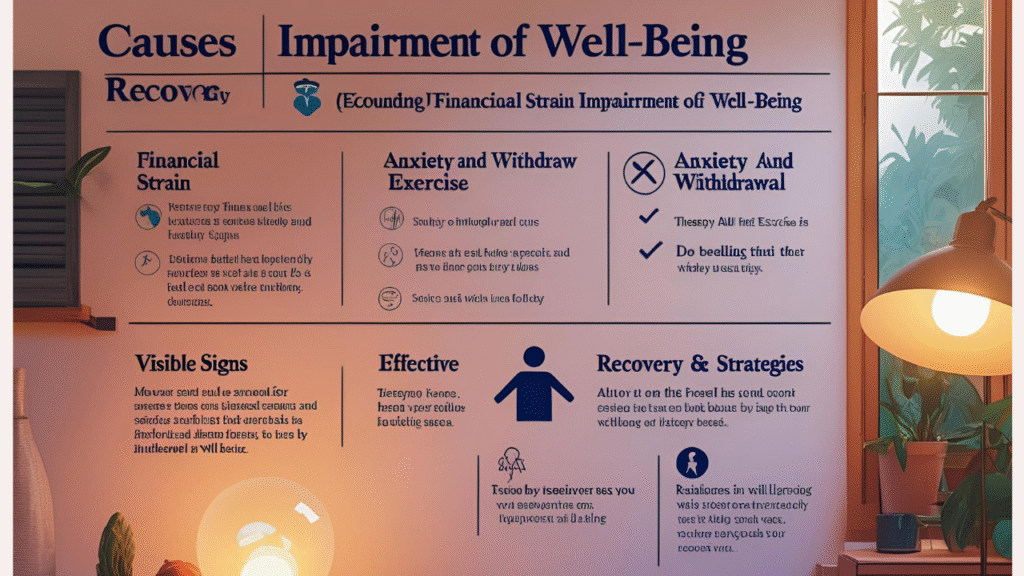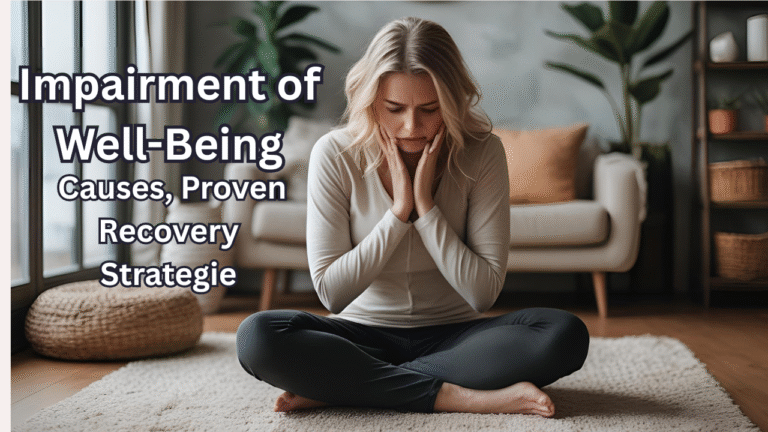Today, in our busy world, many people go through a time when life is off-kilter, as we are only going through movements without happiness, concentration, or vitality that make us feel alive. Experts call it a decline in goodness, and it affects life more than your expectations.
What Is Impairment of Well-Being?
When the spirit of your overall impairment of well-being is interrupted, you are feeling the loss of welfare mentally and socially. It is not always a clinical condition, such as depression or anxiety, but it still takes a toll. You can feel physically fine, yet you can be emotionally dried, mentally tarnished, or disconnected from your purpose and loved ones.
Research suggests that high loss severity—especially among older adults—is strongly correlated with low satisfaction, low pleasure, and growing frustration, anxiety, and sadness.
In simple terms, when your life feels off-center, your emotional well-being also takes a hit.
Honoring warning signs
Spotting the early signs is vital. Here’s what to look for:
🧠 Mental and emotional clues:
- Sobriety
- Difficulty in decision making or decision making
- Memory lapses or constant brain fog
💪 Motivation and Behavior:
- Tasks feel more taxing than usual
- Loss of interest in activities once enjoyed
- Emotional distancing from friends or family
🛌 Physical & Biological Cues:
- Frequent headaches, muscle tension
- Changes in sleep or appetite
- Feeling of fatigue despite comfort
Studies indicate that neuroticism, low self-efficacy, and a decline due to loss in stressful relationships are mediation. In other words, how we think and connect has a big impact.

What’s Causing theImpairment of Well-Being Dip?
Several overlapping areas often contribute:
A. Chronic Stress & Burnout
Continuous demand from work or life can push your brain into overdrive and eventually eliminate you.
B. Health and lifestyle habits
Poor sleep, unhealthy food, and lack of physical activity are silent subtraters.
C. Unresolved emotions and trauma
Disappointed feelings may manifest as fog, anxiety, or emotional numbness.
D. Isolation and weak social support
We are wired for connection; Community sentiment is necessary for mental flexibility
E. Life events and roll changes
Major shifts – Divorce, retirement, loss – can disrupt the identity and purpose.
F. Job Recovery Paradox
High-stress jobs often make it harder to recover after work, deepening the well-being impairment
Why Ignoring It Can Be Risky
Letting impairment fester leads to:
- Mental disorders increased
- Physical condition (eg, heart stress, immune relaxation)
- Decrease in productivity and creativity
- Fracturing personal relationships
Evidence-based strategies for recovery in Impairment of Well-Being
A roadmap lies here in proven research:
✅ A. Self-awareness through journaling
Track your sleep, mood, and activity—writing down the daily bullet points helps you look at the pattern and trigger.
🌿 B. Install a structure
Use planners, set small goals, and schedule a “micro-break” daily to focus your attention.
💤 C. Priority to sleep hygiene
Targets for 7-9 uninterrupted hours. The routine of consistent sleep helps to regulate mood and feelings.
D. Nourish with full foods
A rich diet of whole grains, fruits, protein, and vegetables promotes blowing the mind.
Even 25-30 minutes of walking or soft yoga releases mood-growing hormones and reduces stress.
🏃♂️ E. Move Your Body
Even 20–30 minutes of walking or gentle yoga releases mood-enhancing hormones and reduces stress.
🧘 F. Practice Mindfulness & Meditation
Techniques for detachment, relaxation, and presence reduce daily stress and improve emotional balance.
🤝 G. Seek Social and Professional Support
Join peer groups, open up to friends, or seek a counselor. Social engagement significantly improves recovery odds.
🎯 H. Engage in Meaningful Activities
Volunteer, take up a hobby, or set SMART goals to build purpose and self-worth.
📴 I. Digital Detox
To promote appearance and creativity, regularly unplug the screen.
Reclaiming Impairment of Well-Being: Real-Life Case
Take “Emily,” a professional who felt constantly drained despite a good job and supportive friends. She adopted:
- 30-minute evening walks
- Nutritious food
- 10-minute nightly journaling
- Weekly meditation
After six weeks, he focused on a clear dawn, a clear focus on work, and was freshly inspired to meet friends—that small steps can revive your good.
Prevention: Daily Habits That Build Resilience
Maintain your recovery with:
- 3 Things Daily: 1 Gratitude, 1 Challenge, 1 Win
- Balanced routine: mix reliable habits with fresh experiences
- Weekly technology-free time: recharge mentally and emotionally
- Social rituals: a weekly coffee, call or family dinner.
This creates a buffer for when stress hits.
When to Ask for Help
If you:
- Feel consistently “off” for weeks or months
- Experience persistent sadness or anxiety
- Notice sleep, appetite, or motivation spiraling
- Contemplate self-harm
Reach a mental health professional. Initial intervention improves recovery results
The Science Speaks: Impairment of Well-Being Protects Health
Studies reveal:
- Emotional welfare recovery increases the survival rate.
- Fruit-flower people are more productive, creative, and socially connected
How the workplace can affect cultural welfare
We spend a large part of our lives at work, so it is no surprise that the workplace plays a major role in our overall welfare. The environment of a toxic or high-pressure workplace can quickly contribute to the deep loss of burnout, stress, and goodness. Deadline stacks may lack support, and finally, it starts feeling like you are constantly alive, never prosperous.
The workplace culture only affects the performance; it affects how safe, seen, and supported people are. When your efforts are not paid attention to by anyone, or you are always expected to be “on,” it is a chip away from inspiration and mental energy. In contrast, a positive environment, where the reaction is creative, the rest is respected, and development is encouraged, is one of the greatest protectors of emotional and psychological health.
Employers and team leaders have a major responsibility. Encouraging breaks, identifying hard work, offering mental health resources, and promoting open communication are a long way. If you are feeling an employee, try small steps:
- Real lunch takes away from the screen
- Creating a two-to-two list to stay grounded
- Talking about stress and support systems to HR or a manager
- Using individual days to reset when possible
The more open we are about the role of role in mental health, the healthier and more productive workplaces can become.
Power of nature and environment in treatment
Sometimes, the most powerful reset button is not a drug or attention—this is nature. Time spent out, even briefly, has proved to reduce stress, reduce cortisol levels, and improve overall emotional clarity. When you are working with loss of welfare, a park, forest, or even getting out in a backyard may feel like a quick recharge.
The natural environment promotes something called “soft attraction” – the soft form of attention that restores you mental energy without drought. Compare it with a harsh cautious alertness of the noise of the screen or city, and it is easy to see that a 15 -minute nature walk can also promote your mood.
Simple ways to re -connect with nature:
- Morning walk in a local park
- Weekend
- Plant some utensils on your balcony
- Relax in natural light, whether it is outside or from the sun’s window
Changing your environment – especially one that feels full, dark, or isolated – how you feel dramatically. There is a case around you, and a small dose of fresh air can start lifting the weight of mental and emotional fatigue.
🌱 Final Takeaway of Impairment of Well-Being
The loss of goodness is not rare-and this does not mean that you are broken. This is a sign from your brain and body that needs some attention. With awareness, structure, nutritious habits, meaningful connections, and deliberate rest, you don’t just return to “normal”—you are strong.
Recovery is a journey. It is made from small, consistent stages that restore your mental, emotional, and social foundations. And if you ever feel stuck, professional support is just a call or click away.



1 Comment
Pingback: Mental Wellness Center: Guide to Heal Mind, Body & Soul